Europe enters its Metal Era
Welcome to the 7th edition of our weekly test newsletter, the Polycrisis Dispatch! The longer monthly essay newsletter at Phenomenal World is still happening; this is our attempt at something more accessible, more timely, and consequently all-round more haphazard.
First, the book club is going strong. Our zoom session will be 8am EDT on Thursday June 27, which is 2pm CEST, 10pm June 27 in Sydney, and the rest of the times you can find here.
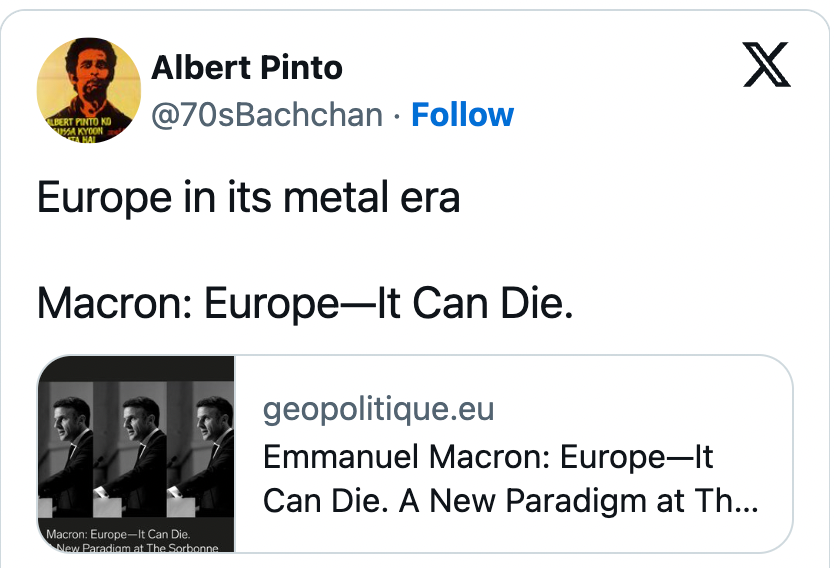
The mood now is even more morose.
There is a lot to be reassured about in the EU election results, but plenty cause for gloom too:
The far-right victory wasn’t as great as anticipated.
Its self-image may be as insurgent outsiders, but the far right has been embraced by the centre right and influenced the centre-right agenda.
And then:
Italy’s pro-Green Deal MEPs actually increased, and the far right lost ground in Spain compared to the national election last year.
But Meloni’s power has strengthened at the EU level.
While Macron’s call for a snap election has sent the French political class into meltdown: left united into a “popular front”, while right and far right are in a Mexican standoff.
And, perhaps, most of all:
It wasn’t a green backlash; people (including, yes, centre-right voters) still care about the climate.
But they have pressing worries that can be exploited.
Country-level polling showed centre-right voters were not keen on far-right parties. For example, CDU and CSU voters in Germany vastly preferred any party to the AfD:
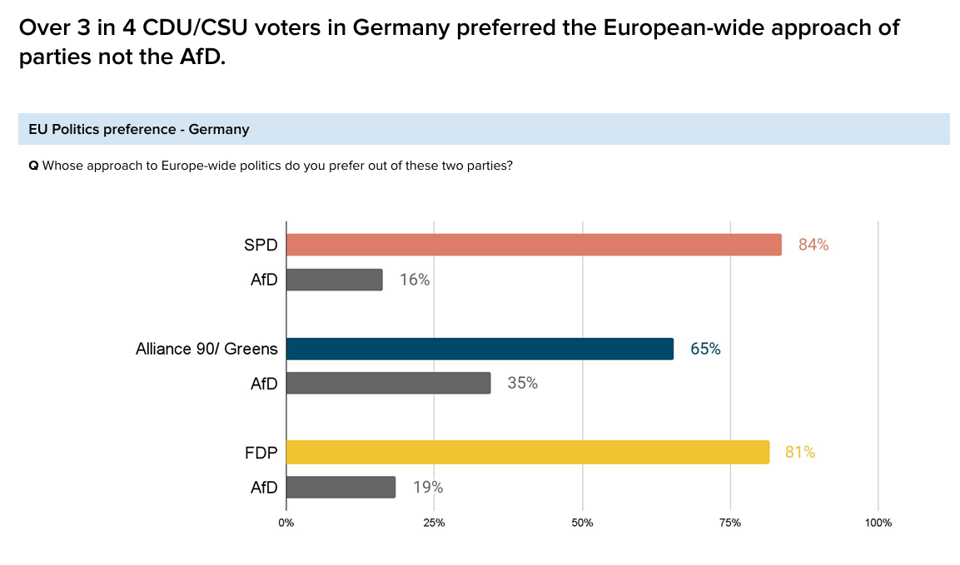
A backlash narrative can be hard to resist. (The FT’s election results editorial was even headline “green backlash”, although the body itself explained precisely why it was not that.)
What there is, though, is a broad worry about the cost of living, which is sometimes successfully wielded against globalism, immigration, and anything that might add to the costs of living — including green policies:
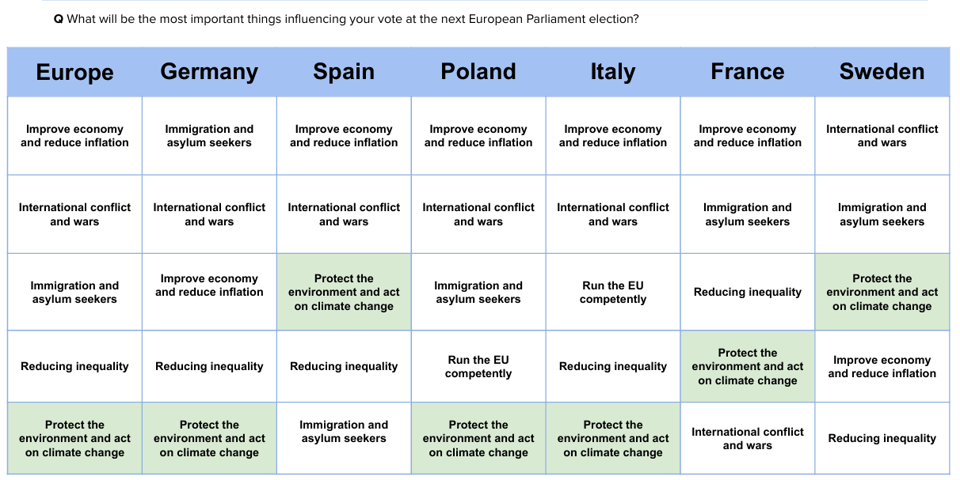
A probable solution to all of this is summed up in the Berlin Summit Declaration, signed earlier this month by a swathe of high-profile Transatlantic economists from across the orthodox/heterodox spectrum: look beyond efficiency, abandon self-defeating austerity, and stop subsidising fossil incumbents. Instead; direct public investment and policy measures towards shared prosperity, quality jobs, and intentional industrial policy.
Political time moves more slowly than climate time, and the EU will have to learn lessons fast. Architect of the Paris Agreement, Laurence Tubiana, counselled after the election:
“The EU needs to respond by prioritising the social dimension – too often neglected. Polarisation can only be addressed with fairer policies and by listening to citizens. This means getting serious about major inequalities in wealth, emissions and between regions.”EU leaders are not completely ignorant of this. A “social climate fund” of almost $60 billion to vulnerable households has been created to accompany the expansion of carbon pricing to new sectors between 2025-2030. As we pointed out last August in “Grievance and Reform”, however, the subsidisation of energy after the invasion of Ukraine happened on a phenomenal scale – between 0.5 and 7.4 percent of GDP was spent by various member states to shield their households and businesses from the price spike.
But money won’t buy votes without politics. As Tim and colleagues wrote in the report, “Permanent Suez”, it will require more than just subsidies:
“People’s entire way of life—from how they heat their homes, what cars they drive, and how their cities look—will need to be transformed in a way that could be felt to be deeply upsetting and unsettling, especially for lower-income and less-privileged people.“The unfairness of the energy transition is made plain when carbon taxes exempt aviation fuel and private jets, and taxes are cut for the wealthy, while ordinary people face higher carbon taxes for heating and transportation fuels. The political vision of modernity sold to European electorates over generations has been centered on the carbon economy. Legitimizing decarbonization requires political leaders to convince their electorates they have a new and better vision for modernity itself, not just pain. The fight over climate policy is about creating domestic political coalitions to support investment, good jobs, and affordable green goods.” Climate policies of the scale and speed necessary will have to promise more than just avoiding harms . In this time of upheaval, people need to see that they are also offered a better life. More focus on “co-benefits” might be a start; US electric school buses reduce asthma in kids not just climate polluting diesel. But the right policies will have to go further and appeal to working class freedoms; as Chris Shaw put it to us, what delivery driver would be excited about having the same low-paid, algorithmically-managed job, only with an electric vehicle instead of an ICE van?
CAT & MOUSE vs EV FITNESS CENTRE
As if the elections weren’t enough, the European Commission this week announced the anticipated tariff hikes on Chinese EVs. Some cars will have tariffs as high as 48 percent – the highest rate is reserved for Chinese companies that didn’t cooperate with Europe’s subsidies investigation.
Will we now see the sorts of cat-and-mouse moves to “re-route” manufacturing that have already been used to get around the IRA EV make-in-America restrictions? EU tariffs require manufacturing in Europe to avoid the extra duty, so going via non-EU countries won’t be the answer. If Mexico is the backdoor to the US, for Europe it is Hungary — and perhaps, Morocco.
Chinese companies already produce some EVs in Europe, while many European-branded EVs are made in China.
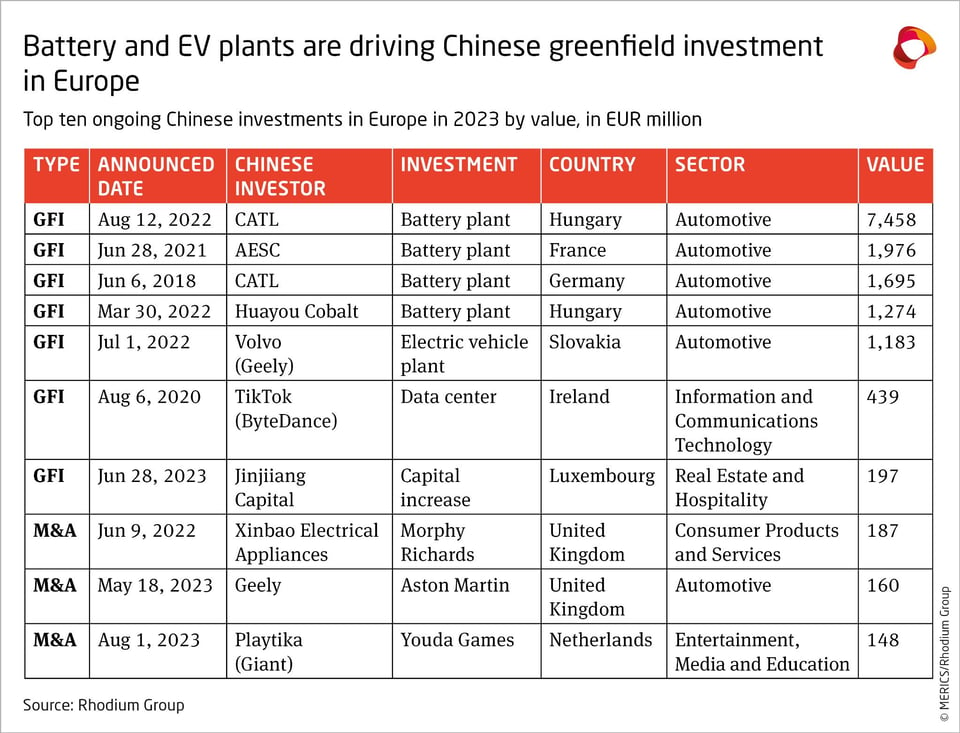
Germany’s powerful carmakers loathe these new tariffs as they fear retribution from China, where the majority of their profits have been made in recent years. Sweden (whose Volvo brand is owned by China’s Geely) and Hungary (where a lot of Chinese auto FDI has gone; per the Rhodium table above) are also opposed. These three countries will need to win support from another 12 governments to overturn the move at a vote in November.
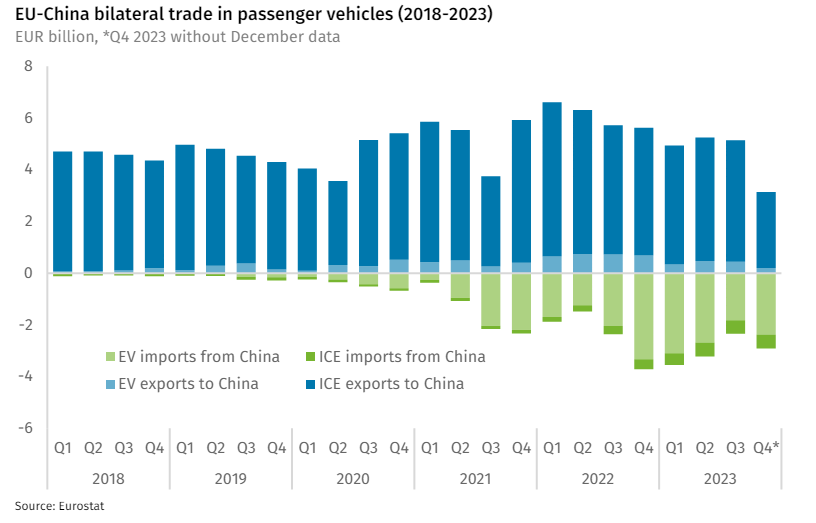
What does the German auto industry hope to achieve by remaining committed to China, when Chinese car buyers increasingly prefer their own domestic brands anyway?
Apart from the massive investments German companies have already made in China, a point to remember - which we explored in “Great Green Wall” last month - is that China is like a gym for EV makers. In a reversal of the old north-to-south transfer of industrial technology, capitalists and engineers need exposure to the techno-production frontier and competitive markets in China to stay lean and mean. Sheltered EU markets won’t cut it. Jorg Wuttke, the former president of EU’s chamber of Commerce argues that even as Western multinationals are squeezed out of China, they have to “be there, it keeps you fit.”
STUFF WE LIKED
Joe and Tracy have a terrific Odd Lots on the rise of Indonesia as a nickel EV player with a little help from China. Joe gives a shout out to our Polycrisis launch ‘Geopolitics of Stuff’ panel where we discussed Indonesia’s ban-exports-and-nationalize’ strategy with him. We have written about Indonesia as a big green developmentalist state, its diplomatic non-alignment strategy, and its contrasting strategy with lithium-rich Australia.
JW Mason unearths the premise behind Western containment of China, and challenges it in “China’s economic growth is good, actually”
Salma El Wardany and Olivia Rudgard on Egypt’s ominous heat and debt crisis
Skanda Amarnath testifies to US Congress on the manufacturing boom
RMI’s third annual energy transition report is out!
Thanks for reading! We will be back late next week, and in the meantime you are welcome to join the Discord server.
Add a comment: